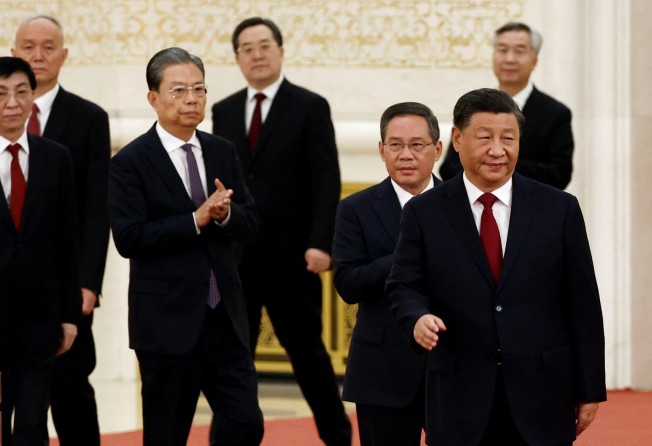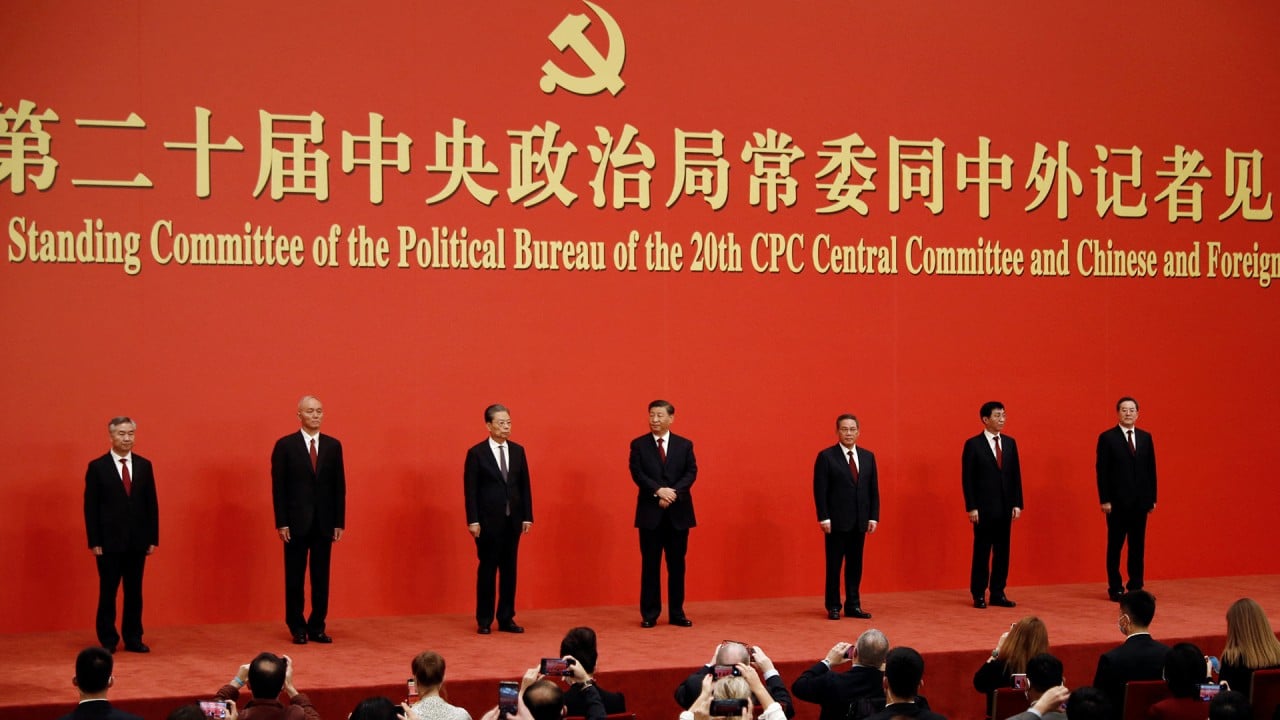Chinese President Xi Jinping looks to fresh faces to confront new term of ‘unparalleled complexity’
- Four younger leaders have been promoted to the Politburo Standing Committee but there are no obvious successors among them
- Choices for Communist Party’s top decision-makers point to preference for experience in science, technology and security

Chinese paramount leader Xi Jinping promoted four rising stars – Li Qiang, Li Xi, Ding Xuexiang and Cai Qi – to the country’s highest decision-making body, laying the foundation for his record-breaking third term and beyond.
Together with veterans Wang Huning and Zhao Leji, the seven will form the new Politburo Standing Committee.
The combination of experienced and fresh faces will support the president and his policies for the next five years, a period Xi described as of “unparalleled complexity”.
While the four newly elevated leaders are young and have Xi’s trust, none of them stands out as an obvious successor to the president, a status determined not only by age but by a number of factors, including experience and internal recognition.
This could mean Xi may get a fourth term at the next national party congress in 2027, various experts told the Post.
According to state news agency Xinhua, the new hierarchy of the Politburo is Xi Jinping, 69; Li Qiang, 63; Zhao Leji, 65; Wang Huning, 67; Cai Qi, 66; Ding Xuexiang, 60; and Li Xi, 66.
This means Li Qiang is set to become China’s next premier, as the South China Morning Post reported earlier.
While the state and government positions will only be confirmed later, the party order offers the clearest indicator as to who might get what. The premiership, for instance, is usually reserved for the second or third-ranking leader in the party. It is traditionally headed by someone with a wealth of local governance experience, making Li Qiang the outward choice.
Cai Qi is the first secretary of the party’s secretariat – taking over from Wang Huning – and will be responsible for the day-to-day running of major party affairs.
Zhao Leji, now ranked third, is likely to head the National People’s Congress, while Wang Huning will take over the Chinese People’s Political Consultative Conference, an important platform to mobilise outside party resources and support.
Li Xi is head of the powerful anti-corruption body, the Central Commission for Discipline Inspection, taking over from Zhao Leji.
Overall, the changes are bigger than expected by overseas observers.
There are some notable surprises on the Politburo membership list announced on Sunday.
The size of the Politburo, the inner circle of the Communist Party leadership, has been reduced to 24 – one fewer than before. The Central Committee, which is one rank below the Politburo, has grown from 204 to 205.
Although he is still on the Central Committee, Hu Chunhua is the most conspicuous omission from the Politburo, and his exclusion means he must step down as vice-premier and take on a less important job.
At 59, Hu is way below the customary retirement age and the omission marks a dramatic turn in his career, given he was considered a strong candidate for premier by many observers.
In another departure from tradition, there is no woman in the Politburo for the first time since 2002 at the 16th congress. It also means that for the first time in two decades there will be no woman vice-premier when the government reshuffle is confirmed at the annual legislative sessions in March.
However, candidates with science and technology backgrounds are clearly in favour as Xi doubles down on innovation and technology to counter the United States’ stranglehold and to drive China’s economy.
At least six new members of the Politburo have qualifications and experience in science and technology.
Zhejiang party chief Yuan Jiajun is an aerospace engineer by training and was in charge of China’s manned space programme. Li Ganjie, Shandong party chief, is a nuclear safety expert who graduated from Tsinghua University.
Their promotions to the Politburo mean more important government posts could be ahead.
Among the 205 Central Committee members, 203 have at least a tertiary degree. The group represents a cross-section of scientific experience, with 29 of the cohort members of the Chinese academies of science and engineering, up from 25 five years ago.
Security is the other focus of Xi’s attention, with two members from the security apparatus sitting on the powerful Secretariat, responsible for the day-to-day running of party affairs.
This marks a departure from the tradition of each key party sector sending one member to the Secretariat.
There have been times over the past two decades when the security apparatus did not even have one representative on the seven-member body. Now they have two.
The party also reshuffled the military supreme command.
As expected, Xi retained his position as chairman of the Central Military Commission – the highest command of the People’s Liberation Army.
He is now supported by two vice-chairmen: his long-trusted ally General Zhang Youxia and rising star General He Weidong.
He Weidong, who has had three promotions in a decade, was commander of the Eastern Theatre Command from 2019 to 2022.
Just five years ago he was not even a Central Committee member but now he sits on the Politburo and is ranked No 2 two in the world’s biggest fighting force – one of the most dramatic promotions at the 20th congress.
He boasts extensive experience in military operations in the Taiwan Strait and is said to have been a key planner of the unprecedented military drill encircling Taiwan in response to US House Speaker Nancy Pelosi’s visit to the self-governed island in August.
On the economic front, Li Qiang is set to be premier, and Ding Xuexiang is most likely to be executive vice-premier. Both enjoy a good rapport with Xi.
With Xi’s trusted economic aide Liu He retiring, National Development and Reform Commission chief He Lifeng is tipped to take over most of Liu’s portfolio and become a vice-premier.
Xi delivered a short closing speech to the media at the Great Hall of the People on Sunday.
The confident-looking president, now firmly established as the most powerful Chinese leader in decades, vowed that his team would “work diligently” to “prove worthy of the trust of our people” and deliver the grand vision he laid out – of turning China into a leading power by 2049.
“The journey ahead is long and arduous, but with determined steps, we will reach our destinations,” Xi said. “We will not be daunted by high winds, choppy waters or even dangerous storms, for the people will always have our back and give us confidence.”
He also took the opportunity to offer a cordial note to the outside world, pledging that China would champion the common values shared by the international community and work with other countries for the greater good.
“The world is grappling with unprecedented challenges. We have consistently called on the people of the world to grasp and shape the future and destiny of humanity,” he said.
“When all countries pursue the course of the common good, we can live in harmony, engage in cooperation for mutual benefit and join hands to create a brighter future for the world.”
